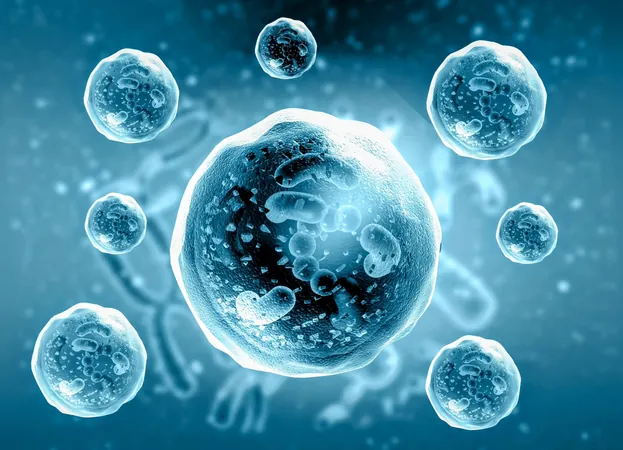
Surprising New Findings Reveal Memory Lies Beyond the Brain!
2024-11-11
Author: Chun
Title: Surprising New Findings Reveal Memory Lies Beyond the Brain!
For decades, the prevailing belief in the scientific community has been that memory and learning are functions exclusive to the brain. With its intricate network of neurons and synapses, the brain has long been considered the sole repository of our memories. However, groundbreaking research is challenging this notion, suggesting that memory may be stored not only in our neurons but also in various other cells throughout the body.
A pioneering team of researchers, led by Nikolay V. Kukushkin at New York University, conducted an illuminating study that indicates non-brain cells might also play a significant role in memory formation. This revelation opens up exciting possibilities in our understanding of memory mechanics and could lead to innovative treatments for memory-related conditions.
What Sparks Memory?
Think of your memory as an extensive filing system within your brain. Each time you encounter something new, like meeting someone or acquiring knowledge, your brain meticulously encodes and organizes that information. These memories take root in different brain regions according to their nature—visual memories in areas processing images, while facts and figures settle in regions governing logic and language.
When it's time to recall, your brain acts like a computer search engine, sifting through these archives to retrieve the relevant file. Sometimes, this process is effortless, but other times, particularly with less frequently accessed memories, it can be tricky. This inconsistency is further influenced by various factors like sleep, stress, and diet, all of which can affect memory retention and clarity.
Memory Formation: A Look Beyond the Brain
Kukushkin and his team didn’t just accept traditional notions; they delved into whether cells outside of the brain could also engage in learning and memory. Utilizing the well-known massed-space effect—the principle suggesting that spaced learning sessions yield better retention than cramming—the researchers set out to explore this concept with two types of non-brain cells: those from nerve and kidney tissues.
In a controlled laboratory environment, these non-brain cells were exposed to different patterns of chemical signals, mimicking how brain cells respond during the learning process. What was most striking? The non-brain cells activated a "memory gene," previously thought exclusive to brain cells, indicating they too could form memories.
Revelations From the Research
The findings from this research are nothing short of revolutionary. The study revealed that these non-brain cells could recognize patterns of chemical pulses—just like neurons in the brain recognize when information is repeated in a spaced-out manner instead of crammed. Cells exhibited a stronger and more extended activation of the memory gene when exposed to these spaced intervals, affirming that the ability to benefit from repetition is a fundamental characteristic shared by all cells, not just those in the brain.
Kukushkin noted, "This reflects the massed-space effect in action... It shows that the ability to learn from spaced repetition isn’t unique to brain cells, but, in fact, might be a fundamental property of all cells."
Future Implications of the Study
These astonishing revelations not only reshape our understanding of memory but herald a potential paradigm shift in treating memory impairments. Kukushkin elaborates, "This discovery opens new doors for understanding how memory works and could lead to better ways to enhance learning and treat memory problems." He further emphasizes the need to consider our bodies holistically: "In the future, we may need to treat our bodies similarly to how we understand our brains—thinking about how our organs 'remember' various patterns, such as our pancreas learning from our dietary habits or cancer cells recalling chemotherapy treatments."
As this research continues to evolve, the implications for education, mental health, and medical treatments stand to be profound. This pioneering study invites us to rethink how we view memory, paving the way for revolutionary advancements in both science and healthcare.
In an era where understanding memory has never been more crucial, this discovery might just change everything. Are we on the brink of unlocking the full potential of our bodies in the pursuit of knowledge and healing? Only time will tell!



 Brasil (PT)
Brasil (PT)
 Canada (EN)
Canada (EN)
 Chile (ES)
Chile (ES)
 Česko (CS)
Česko (CS)
 대한민국 (KO)
대한민국 (KO)
 España (ES)
España (ES)
 France (FR)
France (FR)
 Hong Kong (EN)
Hong Kong (EN)
 Italia (IT)
Italia (IT)
 日本 (JA)
日本 (JA)
 Magyarország (HU)
Magyarország (HU)
 Norge (NO)
Norge (NO)
 Polska (PL)
Polska (PL)
 Schweiz (DE)
Schweiz (DE)
 Singapore (EN)
Singapore (EN)
 Sverige (SV)
Sverige (SV)
 Suomi (FI)
Suomi (FI)
 Türkiye (TR)
Türkiye (TR)
 الإمارات العربية المتحدة (AR)
الإمارات العربية المتحدة (AR)